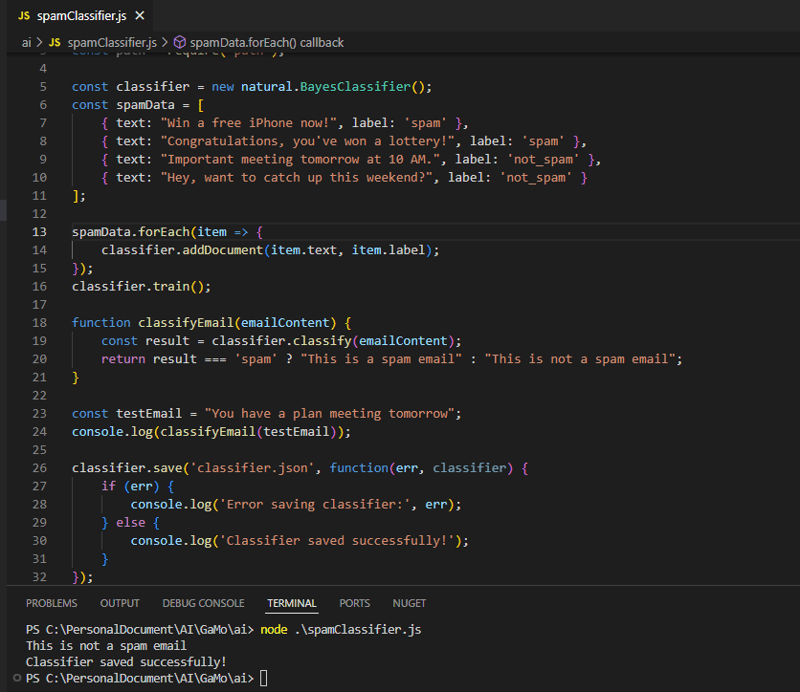使用 node.JS 进行垃圾邮件分类
此项目使用 node.js 和 natural 库创建一个基于 ai 的应用程序,将电子邮件分类为 垃圾邮件 或 非垃圾邮件。该应用程序使用朴素贝叶斯分类器进行垃圾邮件检测,这是文本分类任务的常用算法。
先决条件
开始之前,请确保您已安装以下软件:
设置项目的步骤
第 1 步:设置您的项目
- 创建项目文件夹: 打开终端或命令提示符并为您的项目创建一个新文件夹。
mkdir spam-email-classifier cd spam-email-classifier
- 初始化 node.js 项目: 在该文件夹中,运行以下命令来创建 package.json 文件。
npm init -y
第2步:安装依赖项
运行以下命令来安装所需的依赖项:
npm install natural
- natural:提供各种 nlp(自然语言处理)工具的库,包括使用朴素贝叶斯进行分类。
步骤 3:创建垃圾邮件分类器
创建一个新的 JavaScript 文件(例如 spamclassifier.js)并添加以下代码:
const natural = require('natural'); // create a new naive bayes classifier const classifier = new natural.bayesclassifier(); // sample spam and non-spam data const spamdata = [ { text: "congratulations, you've won a $1000 gift card!", label: 'spam' }, { text: "you are eligible for a free trial, click here to sign up.", label: 'spam' }, { text: "important meeting tomorrow at 10 am", label: 'not_spam' }, { text: "let's grab lunch this weekend!", label: 'not_spam' } ]; // add documents to the classifier (training data) spamdata.foreach(item => { classifier.adddocument(item.text, item.label); }); // train the classifier classifier.train(); // function to classify an email function classifyemail(emailcontent) { const result = classifier.classify(emailcontent); return result === 'spam' ? "this is a spam email" : "this is not a spam email"; } // example of using the classifier to detect spam const testemail = "congratulations! you have won a $1000 gift card."; console.log(classifyemail(testemail)); // output: "this is a spam email" // save the trained model to a file (optional) classifier.save('spamclassifier.json', function(err, classifier) { if (err) { console.log('error saving classifier:', err); } else { console.log('classifier saved successfully!'); } });
第 4 步:运行分类器
要运行分类器,请打开终端并导航到项目文件夹。然后,运行以下命令:
node spamclassifier.js
您应该看到与此类似的输出:
this is a spam email classifier saved successfully!
第 5 步:加载保存的分类器(可选)
您可以稍后加载分类器模型来对新电子邮件进行分类。以下是加载模型并对新电子邮件进行分类的方法:
const natural = require('natural'); // load the saved classifier natural.bayesclassifier.load('spamclassifier.json', null, function(err, classifier) { if (err) { console.log('error loading classifier:', err); } else { // classify a new email const testemail = "you have won a free iphone!"; console.log(classifier.classify(testemail)); // output: 'spam' or 'not_spam' } });
第 6 步:改进模型(可选)
为了提高垃圾邮件分类器的准确性,您可以:
步骤 7:(可选)与电子邮件系统集成
如果您想从应用程序发送或接收电子邮件,您可以使用nodemailer库来发送电子邮件。
- 安装 nodemailer:
npm install nodemailer
- 发送电子邮件(示例):
const nodemailer = require('nodemailer'); // Create a transporter for sending emails via Gmail const transporter = nodemailer.createTransport({ service: 'gmail', auth: { user: 'your-email@gmail.com', pass: 'your-email-password', }, }); // Email options const mailOptions = { from: 'your-email@gmail.com', to: 'recipient@example.com', subject: 'Spam Email Alert', text: 'This is a spam email alert.', }; // Send the email transporter.sendMail(mailOptions, function(err, info) { if (err) { console.log('Error sending email:', err); } else { console.log('Email sent:', info.response); } });

结论
本指南引导您使用 node.js 和 朴素贝叶斯 设置 ai 应用程序,以将电子邮件分类为垃圾邮件或非垃圾邮件。您可以通过以下方式扩展此应用程序:
- 添加更多训练数据以提高准确性。
- 使用更先进的机器学习技术。
- 将分类器集成到 web 应用程序或电子邮件系统中。




